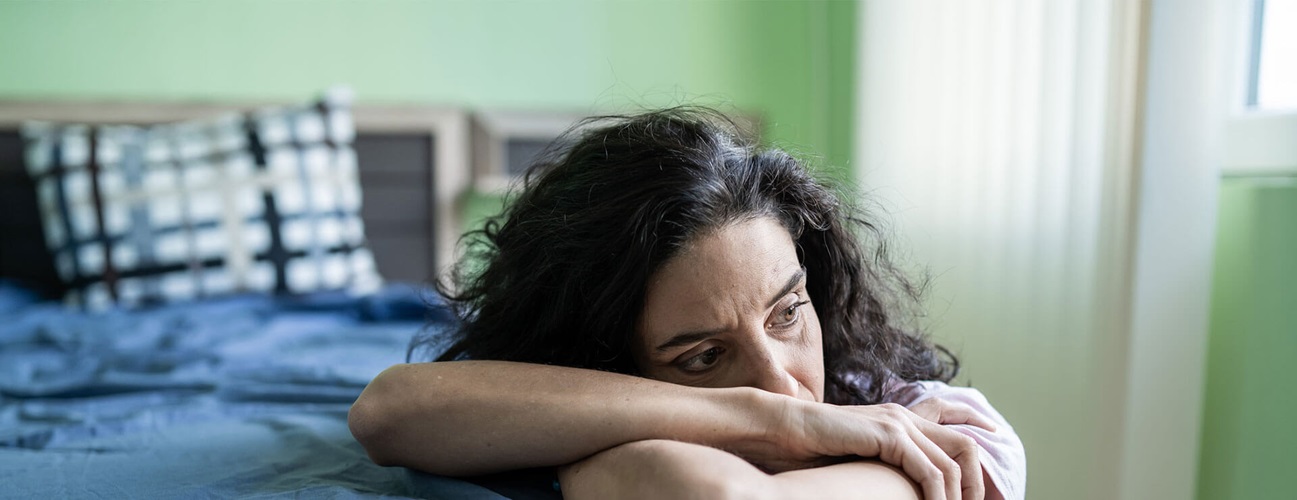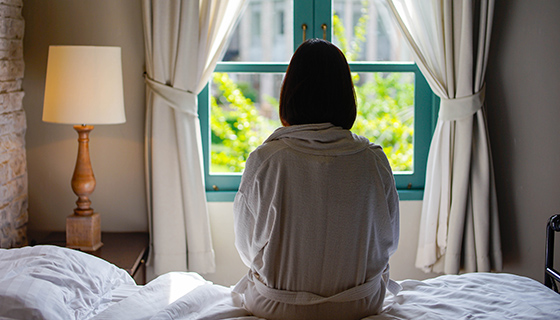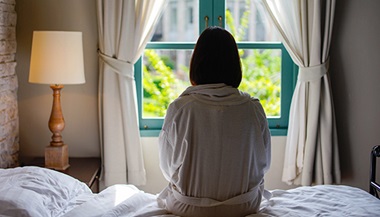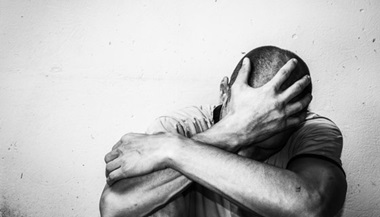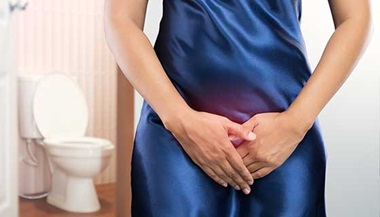Depression
What is depression?
Depression is a whole-body illness. It involves the body, mood, and thoughts. Depression affects the way you eat and sleep. It also can affect the way you feel about yourself and things. It is not the same as being unhappy or in a “blue” mood. It is not a sign of personal weakness or a condition that can be willed or wished away. When you have depression, you can’t “pull yourself together” and get better. Treatment is often needed and many times crucial to recovery.
Depression has different forms, just like many other illnesses. Three of the most common types of depressive disorders include:
-
Major depression. This is a mixture of symptoms that affect your ability to work, sleep, eat, and enjoy life. This can put you out of action for awhile. These episodes of depression can happen once, twice, or several times in a lifetime.
-
Dysthymia. This is a long-term, ongoing depressed mood and other symptoms that are not as severe or extensive as those in major depression. These symptoms can still keep you from functioning at "full steam" or from feeling good. Sometimes, people with dysthymia also experience major depressive episodes.
-
Bipolar disorder. A chronic, recurring condition that includes cycles of extreme lows (or depression) and extreme highs (called hypomania or mania).
Depression and Sleep: Understanding the Connection

Depression and insomnia often go hand in hand. Know the connection between the two, and learn how to recognize symptoms and get treatment for both.
What causes depression?
There is no clear cause of depression. Experts think it happens because of chemical imbalances in the brain. Many factors can play a role in depression, including environmental, psychological, biological, and genetic factors.
Some types of depression seem to run in families. However, no genes have yet been linked to depression.
Women have depression about twice as often as men. Many hormonal factors may add to the increased rate of depression in women. This includes menstrual cycle changes, premenstrual syndrome (PMS), pregnancy, miscarriage, postpartum period, perimenopause, and menopause. Many women also deal with additional stresses such as responsibilities both at work and home, single parenthood, and caring for both children and aging parents.
Many women are especially at risk after giving birth to a baby. Women experience hormonal and physical changes on top of the added responsibility of caring for a baby. These can be factors that lead to postpartum depression in some women. While the “baby blues" are common in new mothers (lasting a week or two), a full-blown depressive episode is not normal and treatment is needed.
What are the symptoms of depression?
The following are the most common symptoms of depression. However, each person may experience symptoms differently. Symptoms may include:
-
Lasting sad, anxious, or “empty” mood
-
Weight and/or appetite changes due to eating too much or eating too little
-
Changes in sleeping patterns, such as fitful sleep, inability to sleep, early morning awakening, or sleeping too much
-
Loss of interest and pleasure in activities formerly enjoyed, including sex
-
Increased restlessness and/or irritability
-
Decreased energy, fatigue, being "slowed down"
-
Feeling of worthless and/or helpless
-
Lasting feelings of hopelessness
-
Feelings of inappropriate guilt
-
Not being able to concentrate, think, and/or make decisions
-
Frequent thoughts of death or suicide, wishing to die, or attempting suicide (Note: People with this symptom should get treatment right away!)
-
Physical symptoms, such as headaches, digestive problems, and/or chronic pain that don’t get better with treatment
Without treatment, symptoms can last for weeks, months, or even years. Appropriate treatment, however, can help most people who suffer from depression.
Depression: What You Need to Know as You Age

Get the help you or a loved one needs, and get the latest expert insights on coping and preventing this mood disorder.
How is depression diagnosed?
Depression often happens along with other medical problems, such as heart disease, cancer, or diabetes. It can also happen with other psychiatric disorders, such as substance use disorder or anxiety disorders. Getting an early diagnosis and treatment is crucial to recovery.
A diagnosis is made after a careful psychiatric exam and medical history done by a psychiatrist or other mental health professional.
How is depression treated?
Generally, based on the outcome of evaluations, treatment of depressive disorders may include one or a combination of the following:
-
Medication. Many different drugs are available, but it often takes 4 to 6 weeks to feel the full effects of anti-depressants. It’s important to keep taking the medicine, even if it doesn’t seem to be working at first. It’s also important to talk to the doctor before stopping. Some people have to switch medicines or add medicines to get results.
-
Psychotherapy. This is most often cognitive-behavioral and/or interpersonal therapy. It focuses on changing the distorted views you have of yourself and your environment. It helps you work to improve your interpersonal relationship skills, and how to identify and manage stressors in your life.
-
Electroconvulsive therapy (ECT). This treatment may be used in people with severe, life-threatening depression that has not responded to medicines. An electrical current is passed through the brain, triggering a seizure. For unknown reasons, the seizures help to restore the normal balance of chemicals in the brain and ease symptoms.
You can also do things to help yourself. Depressive disorders can make you feel exhausted, worthless, helpless, and hopeless. Such negative thoughts and feelings may make you feel like giving up. It is important to realize that these negative views are part of the depression and typically do not accurately reflect the actual circumstances. Negative thinking fades as treatment begins to take effect. In the meantime, if you think you have depression, consider the following:
-
Get help. If you think you may be depressed, see a health care provider as soon as possible.
-
Set realistic goals in light of the depression. Take on only what you reasonably think you handle.
-
Break large tasks into small ones and set priorities. Do what you can as you can.
-
Try to be with other people and confide in someone. It is usually better than being alone and secretive.
-
Do things that make you feel better. Going to a movie, gardening, or taking part in religious, social, or other activities may help. Doing something nice for someone else can also help you feel better.
-
Get regular exercise.
-
Expect your mood to get better slowly, not right away. Feeling better takes time.
-
Eat healthy, well-balanced meals.
-
Stay away from alcohol and drugs, which can make depression worse.
-
It is best to put off important decisions until the depression has lifted. Before deciding to make a major life change — change jobs, get married, or divorced — discuss it with others who know you well. They will have a more objective view of your situation.
-
Remember, people rarely “snap out of” a depression. But with treatment they can feel a little better day-by-day.
-
Try to be patient and focus on the positives. This may help replace the negative thinking that is part of the depression. The negative thoughts will disappear as your depression responds to treatment.
-
Let your family and friends help you.
Key points
-
Depression is a whole-body illness. This means that it involves the body, mood, and thoughts. It is not the same as being unhappy or in a “blue” mood. Treatment is often needed and many times crucial to recovery.
-
There is no clear cause of depression, but doctors think it’s a result of chemical imbalances in the brain. Some types of depression seem to run in families, but no genes have yet been linked to depression.
-
Women experience depression about twice as often as men. Many hormonal factors may play a role in the increased rate of depression in women. These factors may include menstrual cycle changes, premenstrual syndrome (PMS), pregnancy, miscarriage, postpartum period, perimenopause, and menopause.
-
In general, nearly everyone suffering from depression has ongoing feelings of sadness. They may feel helpless, hopeless, and irritable. Without treatment, symptoms can last for weeks, months, or years.
-
Depression may be diagnosed after a careful psychiatric exam. A medical history will be done by a psychiatrist or other mental health professional.
-
Depression is most often treated with medication, psychotherapy, or cognitive behavioral therapy. It can also be a combination of medication and therapy.
Next steps
Tips to help you get the most from a visit to your health care provider:
-
Before your visit, write down questions you want answered.
-
Bring someone with you to help you ask questions and remember what your provider tells you.
-
At the visit, write down the names of new medicines, treatments, or tests, and any new instructions your provider gives you.
-
If you have a follow-up appointment, write down the date, time, and purpose for that visit.
-
Know how you can contact your provider if you have questions.

